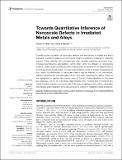Towards Quantitative Inference of Nanoscale Defects in Irradiated Metals and Alloys
Author(s)
Hirst, Charles A.; Dennett, Cody A.
Downloadfmats-09-888356.pdf (38.75Mb)
Publisher with Creative Commons License
Publisher with Creative Commons License
Creative Commons Attribution
Terms of use
Metadata
Show full item recordAbstract
<jats:p>Quantifying the population of nanoscale defects that are formed in metals and alloys exposed to extreme radiation environments remains a pressing challenge in materials science. These defects both fundamentally alter material properties and seed long-timescale performance degradation, which often limits the lifespan of engineering systems. Unlike ceramic and semiconducting materials, these defects in metals and alloys are not spectroscopically active, forcing characterization to rely on indirect measurements from which the distribution of nanoscale defects may be inferred. In this mini-review, different experimental methodologies which have been employed for defect inference are highlighted to capture the current state of the art. Future directions in this area are proposed, which, by combining data streams from multiple and complementary characterization methods in concert with multi-scale modeling and simulation, will enable the ultimate goal of quantifying the full spectrum of defects in irradiated metals and alloys.</jats:p>
Date issued
2022-05-13Department
Massachusetts Institute of Technology. Department of Nuclear Science and EngineeringJournal
Frontiers in Materials
Publisher
Frontiers Media SA
Citation
Hirst, Charles A. and Dennett, Cody A. 2022. "Towards Quantitative Inference of Nanoscale Defects in Irradiated Metals and Alloys." Frontiers in Materials, 9.
Version: Final published version
ISSN
2296-8016